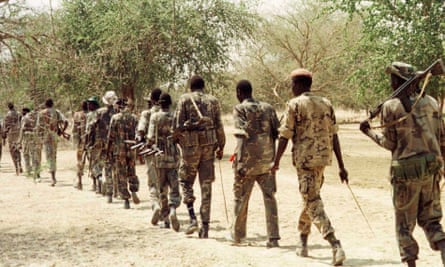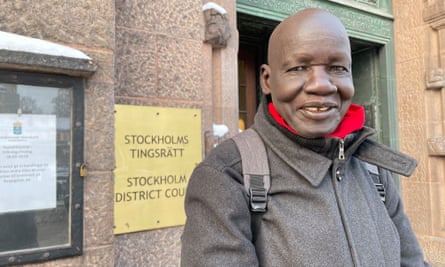According to George Tai Kuony, life in the town of Leer, now located in South Sudan, was tranquil prior to the arrival of Lundin Oil. He had a typical childhood as a village boy, tending to cattle, assisting his family, and attending school. However, in June 1998, everything changed when armed forces invaded the town and permanently altered his life.
He escaped and got separated from his family. He stayed in hiding for a week before he could go back. The 40-year-old lawyer and human rights advocate recalls, “When we arrived, Leer was no longer the same town I had left seven days ago. Everything was in ruins, everything was destroyed. I saw lifeless bodies scattered on the streets.” Due to the violence, he lost his father, and eventually his mother and one of his siblings.
He stated that during that period, the community was unaware of the reasons behind the conflict. The Swedish oil company was unknown to them. Presently, after twenty-five years, Kuony is hopeful for justice as two former executives of the company face trial in Stockholm for being involved in war crimes in Sudan from 1999 to 2003.
Two individuals, Ian Lundin and Alex Schneiter, are currently on trial in Sweden for allegedly requesting that Sudan’s government delegate security responsibilities for a Lundin Oil exploration site to their military and allied militias. The prosecution claims that this action resulted in bombings, deaths of civilians, and destruction of villages. However, both men have pleaded not guilty to the charges.
After a 10-year investigation, numerous interviews, and an 80,000-page report from the prosecution, the trial began in September. The most impactful events are anticipated to occur in 2024, when 61 individuals – such as victims, Lundin employees, ex-UN workers, and notable politicians – will testify. This group includes former Swedish Prime Minister Carl Bildt, who served on the company’s board for five years prior to becoming the country’s foreign minister.

Kuony, who currently resides in South Sudan’s capital of Juba, reflects, “My life has been completely transformed. The discovery of oil in our region should have been a positive change for our community. However, it resulted in a brutal massacre and an attempt to drive us out.”
Since 2006, Kuony has been seeking justice after his group’s attempt to seek resolution in a Sudanese court was unsuccessful. He believes that the trial, regardless of the result, will establish a new legal precedent for multinational companies operating in other countries. It will serve as a stern warning that they cannot behave recklessly without consequences, and that eventually, they will face prosecution.
However, the individuals affected have already suffered a major setback. Ebony Wade, a legal consultant for Civil Rights Defenders in Stockholm, stated that the decision made by the Stockholm district court in November to separate the victims’ claims for compensation from the criminal trial will make it much more difficult, and potentially impossible, to have their cases addressed. This will also cause significant delays in the pursuit of justice.
The plaintiffs’ statements were anticipated to be part of the criminal trial, but this may result in a delay of the civil claims until the conclusion of the criminal trial in February 2026. However, May 2024 will mark a significant event as it will be the first time the court will listen to the testimonies of plaintiffs and victims from South Sudan.
Wade states that it is highly uncommon for corporate leaders to face consequences for serious violations of human rights. He notes that, for the first time, executives of a multinational corporation are being taken to court in a European nation for their involvement in war crimes through their business practices.
She states that there are limited chances for individuals who have experienced serious international offenses to receive compensation. Therefore, this trial holds significant weight.

The Presbyterian Church in South Sudan’s Reverend James Ninrew Dong had to leave Leer due to attacks on religious structures. As a witness and plaintiff in the case, the priest felt obligated to speak out: “We were attacked and forced to flee. What saddened me was that people sought refuge in the church but were unable to find it. They too were displaced.”
According to him, the situation highlights the varying criteria used by European businesses in Africa. He states, “Sweden is known as a leader in promoting peace in Europe and hosting the Nobel Prize ceremonies. It was shocking to see that some individuals from the same country are indifferent and unwilling to acknowledge the historical significance.”
According to him, it is a relief that the case is finally going to court. He questions if this would be possible in Norway, Sweden, or any other European country, to which the answer is no.
Source: theguardian.com


